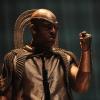
When first asked by Los Angeles Philharmonic Music and Artistic Director Gustavo Dudamel to partner in a concert production of Beethoven’s only opera, Fidelio, DJ Kurs declined. But the award-winning artistic director of Deaf West Theatre — a troupe created by Deaf actors and known for performing musicals such as the Tony-nominated revival of Spring Awakening — ultimately changed his mind.
The result was not only a semistaged opera created for both Deaf and hearing audiences, with three wildly successful performances in 2022, but also a production that the Los Angeles Times’ Mark Swed described as “something altogether new and radical in the annals of opera … [that] transformed the act of listening.” On May 16–17, this Fidelio, with some 135 singers, actors, choristers (singing and signing), orchestral players, and Dudamel again on the podium, returns to Walt Disney Concert Hall before it goes on tour to Barcelona, Paris, and London.

Kurs, through an email exchange, explained he was hesitant about the initial partnership because “I was fearful that opera was an art form that was too far removed from the Deaf community. What changed my mind was that [Dudamel] had worked with Deaf individuals growing up in Venezuela as part of El Sistema, and he demonstrated the commitment to innovation and inclusivity that such collaborations require.”
That Beethoven was also deaf when he composed Fidelio, his opera that premiered in 1805 and whose plot deals with, among other things, the rescue of a political prisoner, was another reason Kurs accepted the gig. “The opportunity to reinterpret Beethoven’s work through the shared lens of our own experiences as Deaf individuals, integrating sign language and our own perceptions of music, became too compelling to pass up.”
Having made history with the original collaboration, Kurs, who grew up in Southern California and took the helm of Deaf West in 2012, is excited to revisit this production. “This is new ground,” he wrote, “not just for our company but for the art form. It has been thrilling to see how the performances have evolved since, with new members of the ensemble bringing their own facets of artistry to the material. It’s a rare privilege to continue to push the boundaries and perfect the recipe for success.”
No stranger to musicals, Deaf West, which was founded in 1991 by Deaf actor Ed Waterstreet, has mounted such works as Pippin (a joint venture with Center Theatre Group in 2009), as well as the 2003 Broadway revival of Big River. Nevertheless, Fidelio posed challenges for the company’s actors.
“The operatic style required a new vocabulary and a toolset,” Kurs acknowledged. “It also requires our actors to engage with music in a profoundly different context, emphasizing more expansive and expressive gestural communication that reflects the complex elements of the music.”
To that end, Kurs noted that Deaf actors “bring a unique dimension to character portrayal, often communicating in ways that tap deeper into visual and emotional storytelling than traditional singers might. Their facial expressions, movements, and use of sign language convey layers of meaning that can offer a richer, more textured experience. Watching them in action enhances the experience of music in much the same way that choreography does. Their eyes are windows into the soul.”

Film director Alberto Arvelo is once again helming the Fidelio production, and the Venezuelan ensemble Coro de Manos Blancas (White hands choir), whose young, hearing-impaired members will contribute choreography and facial expressions, is also returning. But Kurs explained that some of the roles have been recast. “Each performer,” he said, “brings so much color to each role that it feels like a completely different interpretation. Eighty percent of sign language takes place on the face and the body, for example.”
And while Kurs admitted that we don’t know what Beethoven’s exact process was in composing Fidelio, he noted that he does relate to how the composer is reported to have experienced music.
“Beethoven would hold a wooden stick in his mouth and place it against the headboard of his piano so he could feel the vibrations as he played. He was writing from memory, and at that moment in his life, he was feeling the music, in much the same way that I experience music. Not only through vibrations but through learned understanding and the accumulation of a lifetime of memories. In my world, music is physical, felt, and understood through shadows and reflections. There is so much power in inference that we have not examined.”
This Fidelio will star soprano Tamara Wilson as Leonore and Amelia Hensley as her acting avatar and tenor Andrew Staples as Florestan and Daniel Durant as his double. There will be video screens with signers to cue the actors. And while featuring Deaf performers in opera has decidedly broken new ground, the Oscar-winning 2021 film Coda also proved sign language and music to be a potent mix.
Kurs said he ultimately wants audiences to leave Fidelio with a greater appreciation for the “universality of human emotions and music’s power to transcend barriers. The show speaks to themes such as freedom and love, the power of resilience and the human spirit. I hope our audiences can take in a new perspective on how music and stories can be experienced and interpreted in multiple ways, celebrating diversity and inclusivity.”
Kurs is also keen on staging more operatic projects in the future, not only because of the accessibility of this Fidelio but because the results, he wrote, “are thrilling. I, for one, want to see more harmonic moments in sign language — they are magical! I’ll be there in the first row every time we perform the show.”




